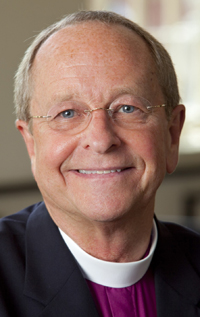PORTLAND — Gene Robinson, the first openly gay bishop in the Episcopal Church, married his longtime partner on New Year’s Day 2010 – the day same-sex marriage became legal in his home state of New Hampshire.
Robinson hopes Maine voters follow in its neighbor’s footsteps and legalize same-sex marriage in a ballot proposal in November. Robinson is coming to Maine on behalf of the campaign seeking to legalize gay marriage, appearing at three screenings of a film about his life and his struggles to be accepted within the Anglican church.
Maine is the second state where Robinson is appearing at showings of “Love Free or Die” for campaigns connected to gay marriage. He is confident the results in Maine will be different from those in North Carolina, where he appeared at screenings of the film a few weeks ahead of last month’s election in which that state’s voters approved a constitutional amendment defining marriage as between a man and woman.
“I have the feeling there’s a real momentum building for marriage equality in Maine, and that makes me very happy,” Robinson said.
The Maine Legislature passed gay marriage in 2009, but it was overturned by 53 percent of the voters in a referendum that fall. Supporters of this year’s initiative say Mainers have become more open to the idea in the past three years.
Robinson’s consecration in 2003 as the first openly gay bishop in the Anglican church created an international uproar and led conservative Episcopalians to break away from the main church in the United States. Robinson, 65, is retiring next January.
“Love Free or Die” had its world premiere in January at the Sundance Film Festival in Utah, where it won a special jury prize.
The film title is a play off of New Hampshire’s “live free or die” motto. Robinson and his husband, Mark Andrew, were married after the New Hampshire Legislature legalized same-sex marriage.
Robinson will attend screenings at the Portland Museum of Art on Monday, at Bates College in Lewiston on Tuesday and at the Grand theater in Ellsworth on Wednesday. Question-and-answer sessions will follow.
He hopes his visit prompts conversation about gay marriage and motivates people to persuade friends and family who aren’t sold on the idea to vote in favor of the referendum.
“I think it will be not too far in the future that we will look back on this the same way we look back on laws that prohibited people of different races from being married or how we look back at slavery,” Robinson said. “All those things over time have so clearly been on the right side of history, and future generations will wonder how good, faithful, responsible people could ever have favored marriage discrimination.”
Bob Emrich, chairman of the Protect Marriage Maine political action committee that opposes same-sex marriage, said he respects Robinson’s right to campaign for gay marriage in Maine, but also thinks it’s “unfortunate.”
“What they’re doing is using a man who’s denied the historical faith of his church and disrupted that whole denomination to serve his own personal purposes, and they’re using him as a spokesman for their cause,” said Emrich, who is pastor of Emmanuel Bible Baptist Church in Plymouth. “I would have a great deal more respect for a man who chose to leave the church if he disagreed with its teachings rather than cause so much division.”
Paul Madore, chairman of the No Special Rights PAC that opposes the referendum, said Robinson represents a radical theology with a “distorted” view of sexuality.
“I think it’s a wake-up call to people living in Maine to take this matter seriously and say no to special rights and no to same-sex marriage,” he said.
Matt McTighe, campaign manager for Mainers United for Marriage, which is spearheading the campaign to legalize gay marriage, said Robinson’s story about his love for God and his love for his partner is inspirational.
“He’s passionate about the freedom to marry and the work we’re doing here in Maine,” McTighe said.
Send questions/comments to the editors.



Comments are no longer available on this story